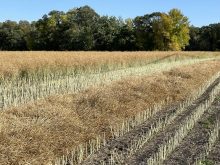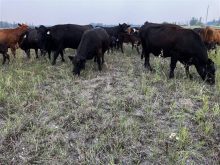The Canadian Grain Commission (CGC) is considering whether it can expand its proposed new insurance-based payment security program to non-licensed buyers such as feed mills.
“We at the commission have had some discussions about it and we’re looking at it,” CGC commissioner Murdoch MacKay told reporters after speaking at the Keystone Agricultural Producers’ (KAP) annual meeting in Winnipeg Jan. 23.
“It’s not falling on deaf ears. We’ve heard and we’re listening and we’re looking at it.”
But MacKay said it’s difficult to know how far to extend producer security.
Read Also

Air, land and sea join forces as Manitoba launches Arctic trade corridor plans
Manitoba wants to take its Arctic trade routes to the big leagues. The Port of Churchill, CentrePort Canada and Winnipeg airport have all raised their hands to help it happen.
KAP has been pushing for the CGC to expand its security program to include feed mills in wake of Puratone, a major hog producer and feed mill company entering creditor protection last fall owing grain farmers around $1 million for grain.
One farmer is owed more than $300,000 and many others are out thousands of dollars, said KAP president Doug Chorney.
“This is unacceptable,” he said. “People in this day and age cannot afford to lose that amount of money on the product they have produced.”
MacKay said the CGC wants to drop its current security program, which requires licensed grain companies to post enough security to cover what’s owed to farmers for the grain they delivered and replace it with an insurance scheme.
“That means we’re looking at a process where companies would pool their risk through an insurance program and they would cover the payment obligations that are required for producers,” MacKay said.
Participating in the insurance program would be a condition of licensing.
The current program requires companies to report their grain stocks and financial status to the CGC monthly. Sometimes when companies fail there isn’t enough security to cover what farmers are owed.
The new system should be cheaper for companies and the CGC to administer and guarantee all farmers 100 per cent of what they are owed, he said.
The CGC is asking insurance companies for more information, and then it will make the details public and consult with the grain sector, MacKay said.
The goal is to have the new system operating by Aug. 1.
“Right now we’re feeling quite comfortable about it and we will continue to move forward on all of these processes,” he told reporters, but added that time frame might be ambitious if the security program is expanded to include unlicensed buyers such as feed mills.
“There are a lot of different feed mills,” MacKay said. “You’ve got big ones, you’ve got mid-size ones and then you’ve got the small ones and then you’ve got one farmer selling to another farmer. Where do you draw the line? We’re looking at it to see if it’s at all possible… No matter what happens it will be an added cost to them.”
If the CGC does expand coverage, it’s likely to initially stick with the 21 grains and oilseeds already covered under the Canada Grain Act, he said.

















